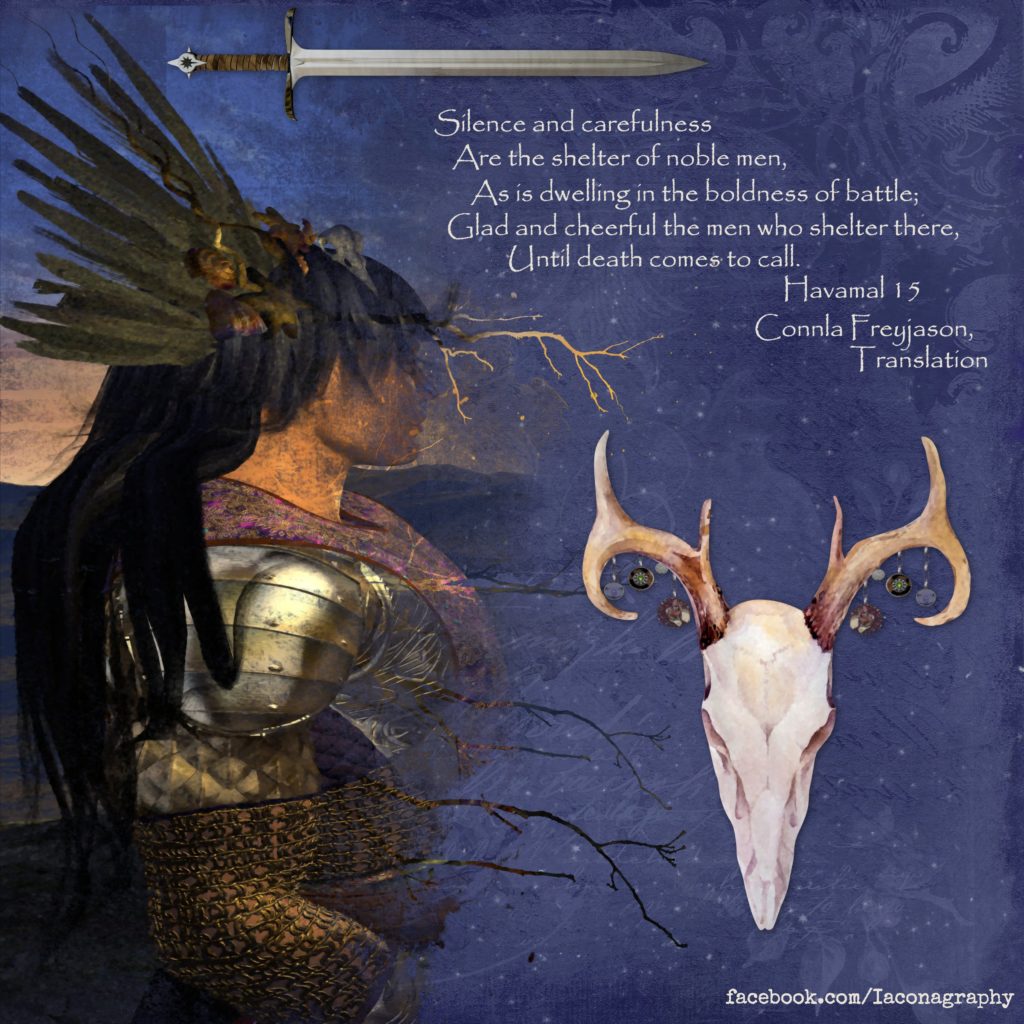Put Down Your Seax And Pick Up Your Heart: The Real Meaning of a Warrior Mentality (Part One)

Silence and carefulness
Are the shelter of noble men,
As is dwelling in the boldness of battle;
Glad and cheerful the men who shelter there,
Until death comes to call.–Havamal 15, Translation Mine
Everybody is so fascinated by the modern ideal of the warrior mentality of the Vikings that many Norse Practitioners go on endlessly about how it integrates with their practice. Unfortunately, most of those “gabbers” don’t seem to have the faintest clue what having a warrior mentality actually means! Emphasis is placed on things like physical prowess, how many weapons one physically owns, and what one would be willing to do with said weapons, if one felt their faith, friends, or family were threatened. However, the Truth of what it means to be a warrior today actually has more to do with picking up your heart, than with picking up your seax.
One need look no further than the Havamal to find the four keynotes of what it truly means to be a warrior:
- Mindfulness
- Determination
- Self-control Coupled with Selflessness
- Focus In Community
Havamal 15, quoted above, teaches the lesson of Mindfulness: a true warrior is not afraid of silence; of going within. A true warrior is care-ful:
careful: marked by attentive concern and thoughtful awareness of
Living in such a state creates a shelter for that person, which they can carry with them at all times. A true warrior knows that they can rely on mindfulness to keep them out of harm’s way, as well as keep them in the right way. What do I mean by the right way? I’m talking about righteousness:
righteousness: acting in a manner that is morally right
Without respecting what is good for the community, as well as one’s own self, one is not a warrior, one is a bully! Moral rightness ultimately means being willing and able to work to put forth more positivity in the world than negativity; being willing to speak up and act out on the behalf of those who may be weaker than ourselves in some capacity, for their betterment, as well as our own. Because, ultimately, the only way to clean up a crappy world is to make it far less crappy!
If we do not make ourselves aware of the crappy things in the world, however, we are powerless to stop them. Hence, Havamal 15‘s instruction to be silent and careful. A “look at me, I’m a Viking” mentality, with all of its “Grog smash” bravado, disables one’s ability to be silent–to pay attention. And when we are unable to pay attention, we become equally unable to care.
A “guide” to true righteousness from a Norse perspective requires neither a PhD in Anthropology, nor a “Heathen version” of the Ten Commandments. Instead, it simply requires a healthy dose of good, old-fashioned common sense:
- Treat yourself and others with equity and fairness, and don’t lie or consistently break promises.
- Honor and protect your faith, your Gods, and your loved ones. (Part of honoring and protecting your faith and your Gods is to actually live a righteous life!)
- Never behave from a place of selfishness and always strive to improve the lives of others. (Translation: don’t be an asshole!)
- Be as willing to learn something new, as you are to teach others what you know, and realize you don’t know everything.
- Welcome change, and be a force for change whenever and wherever it is needed, while at the same time realizing that nothing and no one is perfect: including you.
- Always pay your debts and never shirk your responsibilities nor make excuses to avoid them. (Don’t be lazy or greedy; instead, be the one that people can count on.)
- Always strive for good, and celebrate good whenever and wherever you see it, but don’t celebrate yourself to the point of becoming pompous.
- Never harm the innocent, the outcast, or the good-of-heart; never tolerate those who do. Never strike out purely from a place of anger, violence, or hatred; never tolerate those who do.
- Use your voice and your actions to protect and uphold the innocent, the outcast, and the good-of-heart. Never seek to silence the voices of the innocent, the outcast, or the good-of-heart, and never tolerate those who do.
There is a peaceful ease that arrives in one’s life when they work to live in this manner that is difficult to explain to those who have never experienced it. Fighting doesn’t always have to mean exerting yourself to the point of exhaustion! (Or blood…or bruises….) In fact, the greatest warriors understand that “the open hand can glide, meet its target, and succeed; the rigid hand breaks.” If you have ever actually engaged in physical combat (which most people admittedly have not), then you likely know it is rigidity that leads to broken bones: and I don’t mean the other person’s! The same can be said in all aspects of living one’s life: rigidity causes things to get broken; sometimes, those things include hearts and even minds. When we work to flow, instead of grapple or rage, things in life become more peaceful; more easy. Of course, there are also times when we may need to crash gracefully, in the name of standing up for what is right, but these guidelines for righteousness help us to take such action in appropriate manners, rather than give in to abject negativity, violence, or hostility.
Therefore, the first key to living as a modern warrior is mindfulness: be mindful of one’s self (know your Self); be mindful of others (get to know other people, and also come to care about their welfare); be mindful of what is right (and try to live your life so that you enable more of what is right, than what is wrong). The next key is determination, which we will explore in next week’s blog post:
Put Down Your Seax And Pick Up Your Heart: The Real Meaning of a Warrior Mentality (Part Two)


